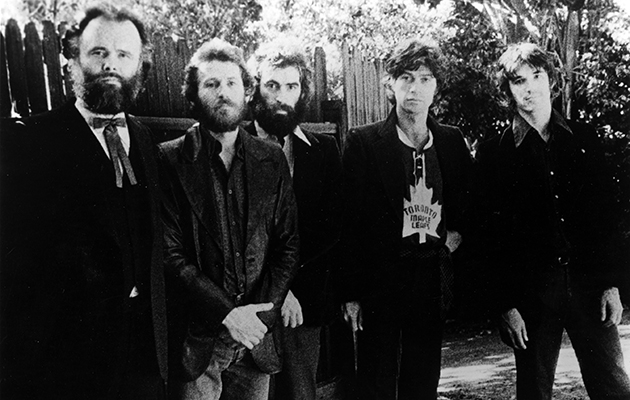“People were like, ‘What kind of music is this? Where in the world did this come from?’” Almost 50 years ago, The Band released Music From Big Pink, an album that drew on the richest musical traditions of America – “From the Ozarks to the Mississippi Delta to the dustbowl,” Robbie Robe...
Big Pink and the surrounding atmosphere became integral to the richly textured character of the music. “You could go outside and scream to the top of your lungs and nobody would ever hear,” says Robertson. “Coming from New York City there was a tremendous freedom to that.”
All the hard, straight edges left their music as the pace of life settled into an agreeable routine. In the late morning they would get up, drink a little coffee, and start gathering in the basement to play music. In their downtime they would throw around a football, or take Danko’s giant poodle, Hamlet, up into the woods for a walk, or play checkers in the living room. Helm was the most competitive while Manuel, John Simon recalls, “used to play ‘backwards checkers.’ It was all about sacrifice. The first to lose all his pieces won. Richard was a champ at that.” There were two typewriters set up in the house. Dylan would write on one when he was around, often running downstairs as soon as he had finished a lyric to see if anyone had any suitable music to go with it: “Tears Of Rage” and “This Wheel’s On Fire” were both written this way. The other typewriter was there so “anybody who had a thought could just put it down before they forgot it,” says Robertson.
“The idea of domesticity was part of the vibe of Big Pink, rather than being an asshole rock musician with your shirt open,” says Taplin. “They were all very close, very funny together. Especially Richard and Levon, they had a really interesting humorous thing, mainly about women and booze.”
“It was a lifestyle,” admits Robertson. “The people, the house, the grounds, everything played a part. There was a kind of experienced innocence. Everyone went with that feeling.”
The bucolic ideal of life at the house has to contend with the reality of four young male musicians living together. There were no housemaids or live-in help. They fended for themselves. It was, says Taplin, “like a college dormitory more than anything else – there was always dirty dishes in the sink. I think Garth was probably more domestic than anybody else.” Hudson recalls the merest hint of a rota. “We each did things to do with the cooking, cleaning,” he says. “Richard cooked. Sure! He was quite good. I think I had something to do with the rest of the house – making sure the rugs were straight and all that.”
“In the kitchen someone was always making little snacks,” says Robertson, but it was no place for the gourmand, more somewhere “you would grab breakfast and coffee,” says Taplin. On warmer days they’d cook outside on the barbecue, with mixed results. Hudson recalls Manuel “pouring some lighter fluid in it. Well, the thing exploded and the flame shot out and burned his ankle. Oh, they were frightening times.”
Visitors would come and go. “You’d get up in the morning, and think, ‘Oh no, Allen Ginsberg just pulled in with Peter Orlovsky, and he’s bringing his harmonium’,” explains Robertson. “Or Charles Lloyd would come up and we’d jam with him.” The Bauls of Bengal were among the more exotic guests. A family of itinerant street troubadours that Grossman had met on a visit to India and had invited to stay in a converted barn in Bearsville, they recorded an album in the basement. Two Bauls, Luxman and Purna Das, are pictured with Dylan on the cover of John Wesley Harding [see panel]. Among the artists, oddballs and occasional superstar, “there were local people we knew who’d come to fix the screen doors, or remove the flying squirrels in the attic,” says Robertson. “There was all sorts of people coming and going, but you had to know where this place was. It was hard to find.” Hudson suggests that uninvited guests weren’t always welcome. “This one guy came up to the house but I frightened him,” he says darkly. “I won’t say how. Or with what.”
Nightlife was limited. Woodstock offered a couple of bars, as well as Café Espresso and Deanies, a restaurant which became the hub of their social activity. They generally made the best of it. “It was subdued in a lot of ways, but we were dealing with men in their early twenties,” states Robertson. “Not so much for me, or Bob, but the other guys would go into town and pick up chicks and come back and party all night long up there.”
“People would smoke pot and drink beer,” confirms Taplin. “Richard would drink hard liquor, but nobody was getting totally plastered. It was quite well behaved compared to what happened later. Rick Danko and Bobby Charles later wrote a song called ‘Small Town Talk’, which was about Woodstock – the point being, if you live in a small town and you act like an asshole, everyone is going to know, including the cops. The cops would go have dinner at the same restaurant The Band would eat at. So Richard had to behave himself, although eventually he was the first one to begin to drink too much.”



